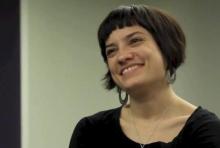Katja Schatte is a PhD candidate, studying post-World War II socialist societies. Her interests range from Cuba to the Soviet Union, and almost everywhere in-between, but her dissertation focuses on the history of Jews in East Germany, a rarely studied community that survived both the Nazi Holocaust and communist religious repression. Schatte seeks to move past the official narratives of the East German regime and Jewish community leaders, to access the everyday experience of what it was like to live as a Jew in the communist bloc.
"With my work I hope to bring together and facilitate different conversations," said Schatte. "For one thing, I want to explore what it means to live in Germany in the twenty-first century, and to challenge the idea that 'unification' is complete. There are still many divisions in Germany—cultural, economic and political. Is there really a need for all Germans to be the same?" She continued, "I'm also excited about being a part of German Jewish history. Not being Jewish myself, I bring a different perspective to it. I'm particularly interested in looking at the ways that non-Jewish communities in Germany have sought to avoid confronting these uncomfortable memories."
Schatte is not only committed to the idea of public scholarship, but also to exploring creative ways to use technology to facillitate the exchange of ideas and viewpoints. She has begun work on a digital humanities project, Beyond the Iron Curtain: Stories of Ends and New Beginnings, to complement her research project. She was also recently featured in the online journal Cuba Counterpoints, which published her article "Europe's Refugee Crisis and the Post-Socialist Margins."
After graduate school, Schatte expects to work outside academia, but plans to remain engaged in public scholarship. "I enjoy research, really digging in. But what I enjoy even more is making that information usable—curating it, presenting it, making it available, enabling dialogues. That is what I really want to be doing in the future."
